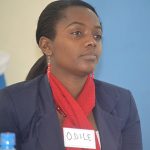On Saturday, the fifth day of the Women’s Health, Masculinities & Empowerment course, participants were taken out on a field trip to a project that works with sex workers. It is the course’s objective to let participants have engaging, hands-on and real life work experiences that they can draw on in their work in the future. Two of the participants, Odile Mukayiranga and Amanda Domingues share with us in their own words their experiences of the field trip.
Odile Mukayiranga: a banker in charge of business development for small earners, Rwanda.
 The day’s highlight was the WAPATI sex workers of Thika. Our interaction brought to light how disempowered the women were and how the organisation is doing so little to fight for their rights (this was clear when the lady who had been forced to have sex with a policeman/rape, spoke about it and much attention was not given to it. It almost felt like it was normal in the group for such sad occurrences to happen). Through creation of awareness and financial education, there is a way of inserting any other information that is useful to the target population. My main focus would be economic empowerment of women which will impact generations to come and will make a difference on who an African woman is.
The day’s highlight was the WAPATI sex workers of Thika. Our interaction brought to light how disempowered the women were and how the organisation is doing so little to fight for their rights (this was clear when the lady who had been forced to have sex with a policeman/rape, spoke about it and much attention was not given to it. It almost felt like it was normal in the group for such sad occurrences to happen). Through creation of awareness and financial education, there is a way of inserting any other information that is useful to the target population. My main focus would be economic empowerment of women which will impact generations to come and will make a difference on who an African woman is.
Amanda Domingues, a second year MA student in the department of African studies at the University of California (UCLA).
 The most significant aspect of Saturday’s excursion was the meeting with WAPATI and their members. WAPATI sex workers provided insight to the causes and struggles of women sex workers in Thicka and, more broadly, sex workers in Kenya at large. Their personal and informative narratives detailed the many abuses that these women face from both their clients and from state officials. This excursion relates to my own research in so much that I am interested in the realignment of public policy with public health evidence and how the legal and political environment is affecting gender-based violence and female sex work in Kenya.
The most significant aspect of Saturday’s excursion was the meeting with WAPATI and their members. WAPATI sex workers provided insight to the causes and struggles of women sex workers in Thicka and, more broadly, sex workers in Kenya at large. Their personal and informative narratives detailed the many abuses that these women face from both their clients and from state officials. This excursion relates to my own research in so much that I am interested in the realignment of public policy with public health evidence and how the legal and political environment is affecting gender-based violence and female sex work in Kenya.